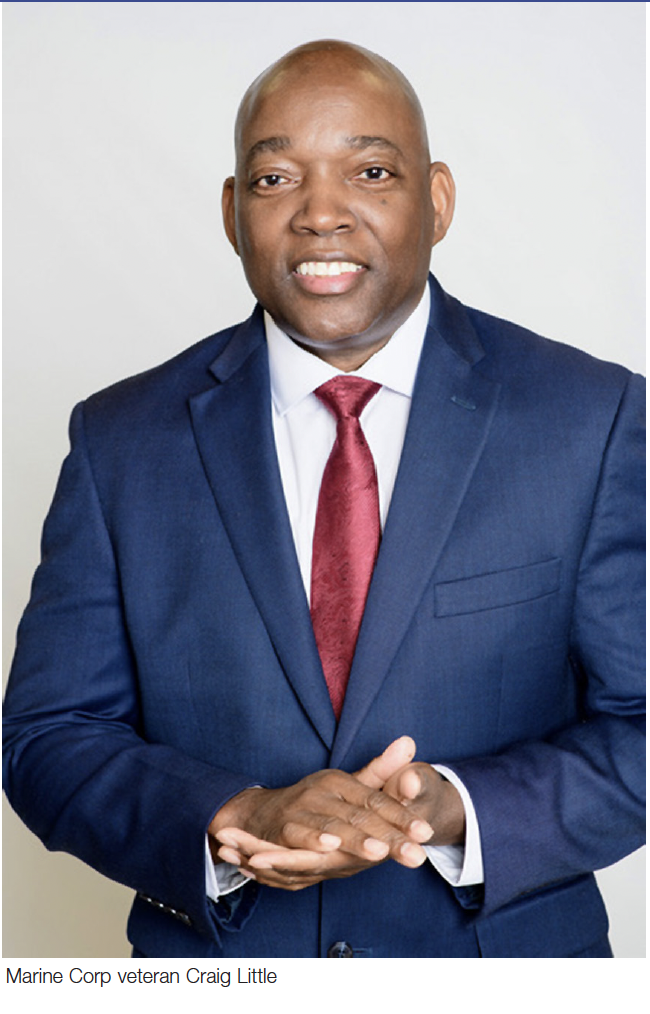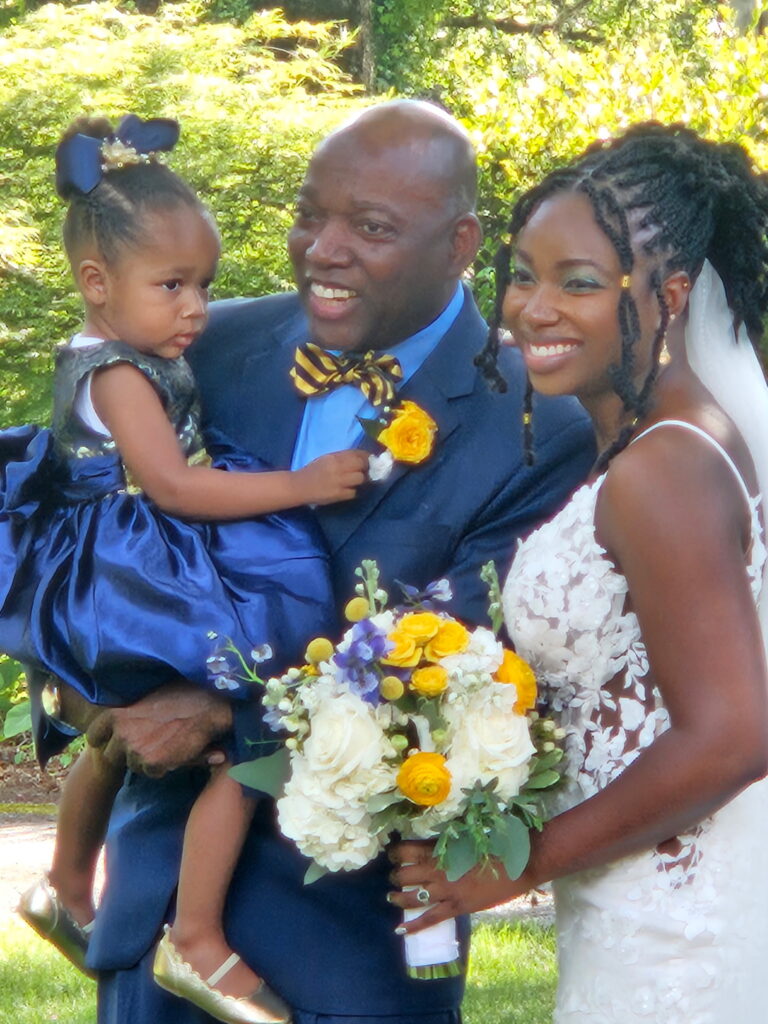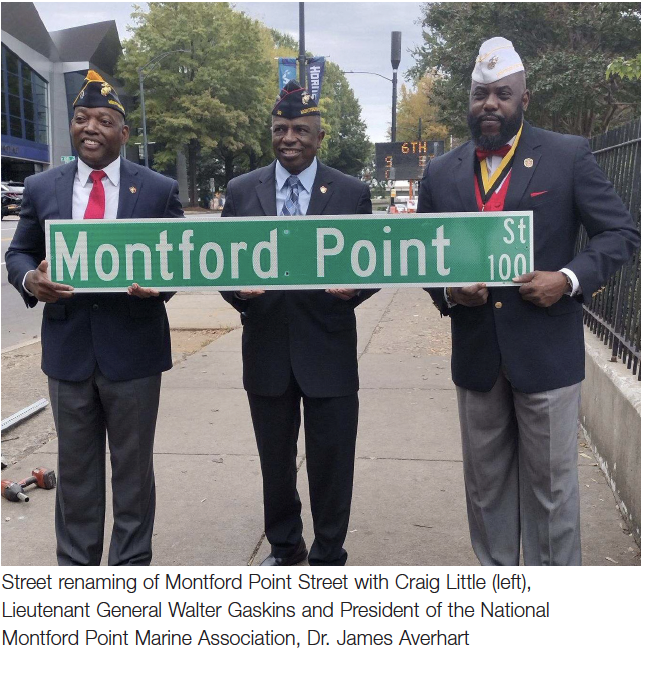By Angel M. Brown

When Craig Little talks about service, it’s never just about himself. The Charlotte resident and 12-year Marine Corps veteran has built a life dedicated to mentoring, advocating, and preserving history. From reactivating the Charlotte chapter of the Montford Point Marine Association in 2019, to securing life-changing benefits for fellow veterans as an Accredited Claims Agent, Little’s journey is rooted in impact. His work recently earned him recognition as one of Charlotte’s Great 28 — a distinction he calls humbling.
“I don’t chase cameras,” he said. “I just want the work to speak. If someone sees what I’m doing and it inspires them to help too, that’s the reward.”
Little credits his time in the Marine Corps with shaping the communicator and leader he is today. Mentoring young Marines on their first deployments taught him patience, empathy, and the importance of reading the room — skills he still uses daily as an audit supervisor.
At home, his shared military background with his wife, Pia, also a Marine veteran, has been a source of strength. “Sometimes you just need quiet,” he explains. “She gets that. She knows when I head to the gym or just sit with a book, I’m okay.”
That same sense of structure guides his parenting. His children and their friends remember him as “no-nonsense” — firm but fair. “I believed in values, responsibility, and independence,” he says. “That’s what the Marine Corps instilled in me, and it carries through.”
Montford Point Marines
While many know the Tuskegee Airmen or Buffalo Soldiers, fewer know the story of the Montford Point Marines — the first Black Marines who trained at a segregated camp in North Carolina from 1942 to 1949. They endured substandard conditions, built their own barracks, and wore hand-me-down uniforms, yet still passed the Corps’ toughest training.
“The Marine Corps was the last branch to end segregation,” Little notes. “Montford Pointers proved they could endure it all and still excel. They were the best of the best.”
Charlotte’s ties run deep. Howard P. Perry, the first Montford Point recruit, was from Charlotte, and Lt. Frederick C. Branch, the first Black officer in the Marine Corps, studied at Johnson C. Smith University. Little helped ensure those legacies were remembered — most visibly through the renaming of Phifer Avenue to Montford Point Street in 2021. He is now advocating for a Frederick C. Branch Road on JCSU’s campus.
“History shouldn’t be hidden,” he said. “It should be embraced—not just as Black history, but as American history.”
Reactivating a chapter
When Little took on the presidency of Charlotte’s Montford Point Marine Association in 2019 he said he quickly set the chapter in motion. His proudest achievements include the street renaming, a Toys for Tots partnership and securing direct accreditation from the Department of Veterans Affairs, allowing the group to file disability claims for veterans across all branches.
“We refuse to be put in a bubble,” he says. “In the Corps, everyone’s green — light green, dark green — but still green.”
This year, Little stepped down as local president after being elected to national leadership. In his place, Carolyn Hayes, an Army veteran, became the first female president of Chapter 40 — a milestone he proudly supported.
One of the chapter’s most impactful initiatives is its Scholarship Gala, which awards $2,500 scholarships to students their first year, and no less than $1,000 for each subsequent year until graduation.
“We’ve had incredible students — 4.1 GPAs, ROTC leaders, young women and men of all backgrounds,” said Little. “It’s about supporting veterans’ families, no matter who they are.”
Advocacy and legacy
As an Accredited Claims Agent, Little has helped countless veterans secure benefits, sometimes full disability ratings, by combing through records for overlooked injuries. He compares the VA process to dealing with insurance companies: “Their job is to pay as little as possible. My job is to make sure veterans get everything they’ve earned.”
He refuses to charge for his work, asking only that veterans join the association or support its events. “Helping is contagious,” he said. “When people see it works, they want to pay it forward.”
Being named one of Charlotte’s Great 28 left Little nearly speechless. “I don’t belong to every circle or clique,” Little added. “So to be recognized just for serving — that means a lot.”
Looking ahead, he envisions growth under new leadership and more women veterans stepping into visible roles. His own legacy, he hopes, is simple — that he preserved history, served those who served, and built bridges across communities. “You may not always see us coming, but you’ll know we’re there.”


